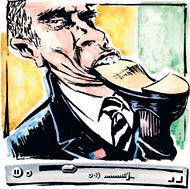YouTube Politics
 The New York Times has an article on the growing influence, or at least impact, YouTube is having on politics.
The New York Times has an article on the growing influence, or at least impact, YouTube is having on politics.
The story was brought on, it would seem, by Senator George Allen's recent bigoted diatribe involving a student working for the opposing campaign's Indian heritage and the slur 'macaca.' Unfortunately for Allen, the incident was caught on video and quickly found its way onto the internet.
The student, working for the opposing campaign, taped the comments, and the video quickly appeared on YouTube, where it rocketed to the top of the site's most-viewed list. It then bounced from the Web to the front page of The Washington Post to cable and network television news shows. Despite two public apologies by Senator Allen, and his aides'’ quick explanations for how the strange word tumbled out, political analysts rushed to downgrade Mr. Allen'’s stock as a leading contender for the 2008 Republican presidential nomination.That's some pretty serious consequences for something that never would have made it to the evening news two years ago. (Rasmussen says 6%.)
When politicians say inappropriate things, many voters will want to know. Now they can see it for themselves on the Web.The article takes the position that YouTude will force politics deeper into the sound-byte, pre-packaged realm. Ex-Bush strategist Matthew Dowd says "that politicians now have to be perfect from Day 1. It's taken some richness out of the political discourse.‚”
But YouTube may be changing the political process in more profound ways, for good and perhaps not for the better, according to strategists in both parties. If campaigns resemble reality television, where any moment of a candidate's life can be captured on film and posted on the Web, will the last shreds of authenticity be stripped from our public officials? Will candidates be pushed further into a scripted bubble? In short, will YouTube democratize politics, or destroy it?
We all know what Republicans mean by the 'richness of political discourse.'
Dowd thinks that YouTube will prevent politicians from crafting a message over time, refining speeches and trying out new frames, all out of fear that the oldversionss will circulate on the internet.
What Dowd misses is that it's not bad speeches and outdated frames that end up being popular on YouTube. It's the spectacular gaffes that YouTube craves. People aren't going to call their coworkers over to their cubicle to show them the video of Senator Smith using last week's talking points. People don't want to watch wonkishness, they want to watch a Senator belittle a college kid using racial epithets.
Politicians only need to worry about letting their personalities slip into speeches if that personality is going to offend the voting population! If you're a racist bastard, then you need to worry about letting something slip out. Politicians don't need to worry about censoring themselves if they aren't going to accidentally use the N-word.
YouTube has left handlers with less control over their candidate's image. For that reason, it's probably good for politics. Plus it allows essentially free forums for campaign adds to be distributed. What's not to like?
Politics YouTube George Allen
Image: Christopher Serra - New York Times






No comments:
Post a Comment